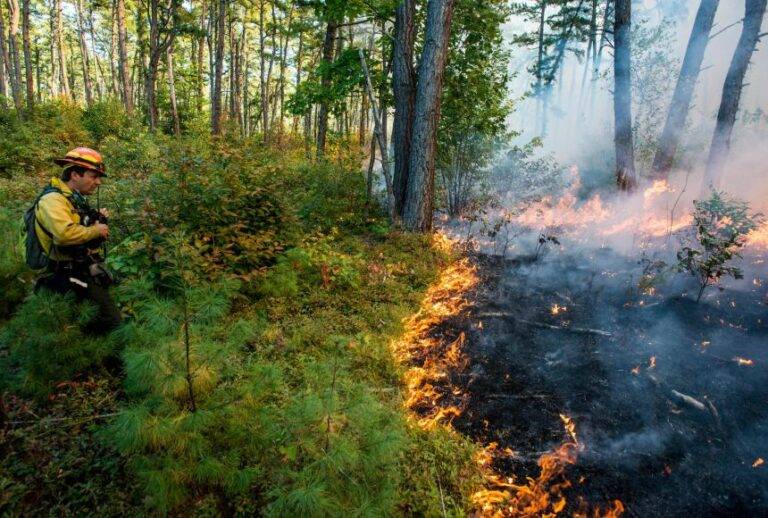Keith White invited an older farmer to his land, which sits on the south edge of Memphis next to Highway 61 and under a row of power lines. White was preparing the 45 acres for soybeans, and the older farmer spotted a weed he had not seen in years: cocklebur.
White was working to make this plot organic. The cockleburs had likely been dormant for years, kept from sprouting by the herbicides sprayed on the soil.
In April, White checked on his land, which was shielded on the edges by lines of trees. What was growing in the field, cereal rye and radish greens, looked no more impressive than weeds. But those plants were the culmination of two years of work. He was building up cover crops, which will lock nutrients into the soil and choke out weeds.
“You have to train it almost like a dog,” White said of the land.
He was farming without herbicides or pesticides as part of a five-year program run by the Memphis-based nonprofit AgLaunch. At the end of the third year, he can officially certify the farm as organic through the Department of Agriculture.
The South has fewer organic growers than the rest of the country. The region’s climate makes it harder to grow without pesticides or herbicides. And most of the South’s organic farms are smaller and grow vegetables. White is a row crop farmer, producing corn, wheat, cotton and soybeans on 1,000 acres scattered around the border of Tennessee and Mississippi. He can’t name another row crop farmer who grows organically, even though organic crops can sell for on average 50% more than conventional crops.
“It’s definitely up in the air. But if it works, it’s going to be very, very profitable,” he said.
What makes a farm organic
Certified organic produce must be grown on land where no prohibited synthetic fertilizers, pesticides or herbicides were used. The USDA only put the certification program into effect in 2002, although organic growing was already increasing in the 1990s. Today, many small farmers, especially those who sell at farmers markets, follow organic practices but skip the cost of certification. And they are often driven more by environmental concerns than profits.
In 2021, farms in the United States sold $6.1 billion worth of organic crops, according to the most recent USDA Organic survey.
Tennessee, Mississippi, Louisiana and Alabama ranked near the bottom of the country for certified organic farms. California topped the list, with 3,061 of the 17,445 organic farms in operation that year.
In the South, it’s not easy being green
Growing organically is harder everywhere.
Organic farmers cannot use pesticides, herbicides or genetically modified seeds. Organic farming requires more workers. A 2015 USDA study found that the labor cost on organic farms was $37 per acre more than on conventional farms. The three-year waiting period for organic certification also means that in the beginning farmers are spending more and getting the lower yields of organic crops without being able to charge the higher prices.
In the South, where the weather is warmer and wetter, organic farming is even more difficult.
“We have a really nice, long growing season, but that also means we have a very nice insect season,” said Christine Coker, a professor of horticulture at Mississippi State University. “And where there is humidity, there are bacteria and fungus.”
Farmers in the South also have few places where they can learn about organic growing.
“There is relatively little research done on the conditions in the South,” said Joseph Schafer, a program manager at Winrock International.
Winrock, an Arkansas-based nonprofit, received a $1.25 million grant in 2021 from the USDA to study organic farming in Arkansas, Tennessee and Missouri.
Herbicides like dicamba sprayed from crop-dusters can also drift into fields of organic crops, killing the plants that are not genetically modified to withstand the chemical. In the South, farms are often closer together than in other regions, where pastures and trees might separate fields.
“It was quite amazing to discover that farms can be hit by drift miles and miles away from where any dicamba is used,” Schafer said.
The future of organics in the South
Shawn Peebles, who now farms 1,900 acres in the Arkansas Delta, switched to organic farming 15 years ago because he was out of options.
“I was broke,” Peebles said. “All the good ground was scooped up by the larger farmers.”
Peebles sold off his large tiller and spray rig, and bought old tractors and equipment that other farmers had not used for decades. The first year, Peebles farmed only 200 acres of organic soybeans, but he made more money than any year before.
“The biggest challenge for me was realizing that I was more susceptible to weather and had to be more on top of my crop,” he said. “But I also realized that I don’t have to farm as many acres.”
Pete Nelson, the president and executive director of AgLaunch, believes eventually many farmers will have no choice but to grow organically. Consumers will demand more organic food. He wants farmers in the South to be ready for that change.
“The tide has turned,” he said. “We’re sort of betting the farm, if you will, that to be successful long term you’ve got to move in that direction.”
Todd A. Price writes about food and culture in the South. He can be reached at [email protected].
This content was originally published here.




















